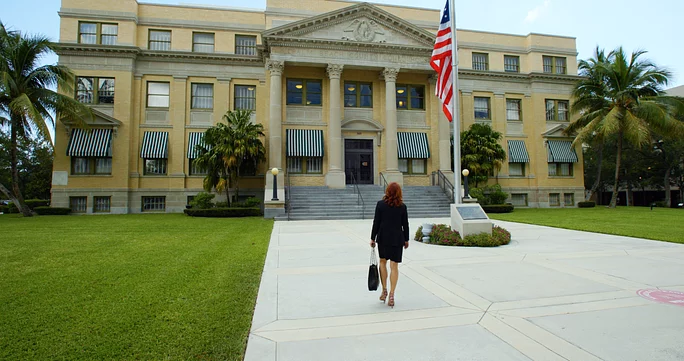Florida Divorce Law Basics From a Palm Beach County Divorce Lawyer
When people get married, they’re rarely thinking about divorce. It can be a traumatic experience—or a freeing one. But the one thing it almost never is? Simple. It can make anyone feel like they’re in a war zone on foreign territory.
But there’s good news if you are getting divorced in Palm Beach Florida. You don’t have to go through it alone, and divorce does not have to mean disaster.
If you’re considering divorce in south Florida, the first step is to get a handle on how it works in this jurisdiction. Even though you’ll have an attorney to help you through the process, knowing the basics ahead of time can keep you ahead of the curve. It will also keep the experience from being more difficult than necessary.
We’re going to cover the basics of what you can expect in a Palm Beach divorce and follow up with answers to the questions we know you have, such as:
- What are divorce laws in Florida like? How are family bills paid during the divorce process?
- How will divorce affect my children?
- What is equitable distribution?
- What is marital property and how does division of property work?
- What are grounds for divorce?
- Will I receive alimony after my Palm Beach divorce?
Dissolution of Marriage and the Filing Process
In Florida, divorce is officially called a Dissolution of Marriage. To file, one or both spouses must be a Florida resident for at least six months. If you want to file for divorce in Florida but haven’t been in a Florida county long enough, you should immediately get a Florida driver’s license or ID card. Then you can file when you have been here a full six months from the date of your Florida DL or ID card.
In order to divorce in Palm Beach County, you or your spouse: (1) need to live, or in the past have lived, in Palm Beach as a married couple; or (2) mutually agree for your case to be filed in Palm Beach County. This falls under a concept known as venue, the county where your case is filed and where the court has jurisdiction. The venue is typically the county where you last lived together as a married couple or where your children live (if you have children).
However, if you and your spouse are in agreement, you can file your case in any county in Florida of your choosing. Which, of course, includes Palm Beach County.
Filing for divorce is a petition to the court to dissolve your marriage. Your or your spouse’s attorney drafts the petition for dissolution of marriage for notarized signature. It is then filed with the circuit court of Palm Beach County.
Depending on the logistics in your case, you can either request a summons be issued for formal service of process by a licensed process server or deputy sheriff, or have the other party’s attorney accept service, which is a routine practice of professional courtesy between attorneys. It is also less dramatic!
Once the petition has been filed and service accepted, within 20 calendar days, you or your spouse must file an answer and may file a counter-petition if there is any court relief the other party seeks in return.
The petition asks the court (meaning the judge assigned to your case) to dissolve the bonds of your marriage and restore you to being single and unmarried. Florida has been a no-fault divorce state since approximately 1971.
No-fault means you don’t have to prove any grounds for divorce except to state the marriage is irretrievably broken and that nothing can fix it. There is no fighting a spouse’s request to be divorced: it only takes one person in the marriage to break the marriage.
What happens if a spouse fails to respond to your divorce filing?
If a spouse doesn’t respond to the petition by or before 20 calendar days, the other party may file a Motion for Default with the court clerk, which allows you to set a hearing. The default is set for hearing before the judge assigned to your case, and the other party must show cause why no response was filed.
If there is no cause or the other party fails to appear, all relief requested in the petition may be granted at a subsequent hearing.
Winning by default rarely happens if your case involves marital property and/or minor children of the marriage. A respondent in a divorce case is given every opportunity to defend his or her interests. So, don’t count on this being how you win your case.
After a response and/or counter petition is filed, the case’s discovery phase commences. In the discovery phase, you and your spouse are required to exchange what is known as mandatory disclosure. This is complete after each of you prepare and file a financial affidavit and specific financial records are fully disclosed and exchanged. Your deposition may also be taken in the discovery phase, and you may be served with interrogatories and requests to produce additional records.
Once discovery is complete and the case is ready for trial, in Palm Beach County, you and your spouse must attempt to resolve your differences in a negotiation conference called mediation before you are permitted to go to trial.
Most Divorces End At Mediation:
The majority of cases in Palm Beach and Broward counties are resolved at mediation.
Mediation is similar to a trial, but it is not held in a courtroom with a judge. It is less formal, and the Florida rules of evidence do not apply.
Typically, you and your attorney are placed in separate rooms (or separate chat rooms in a virtual mediation). Mediation is not binding if one or both spouses do not agree to the negotiations. It is a voluntary process, meaning whether you or your spouse except the settlement terms of the other or not is completely voluntary.
The mediator is not a judge but a neutral family law attorney (typically) trained and skilled at guiding negotiations on key issues.
Your mediator will typically lean on each of you equally, requiring you both to make concessions to facilitate a full settlement of your case.
If mediation is successful and a full settlement is reached, your attorneys will draft what is known as a marital settlement agreement. If you have children, a parenting plan will also be drafted. Once you and your spouse sign these documents, your case is effectively over.
The attorneys will prepare a proposed final judgment of dissolution of marriage and submit this to the judge in your case. Once the judge signs the final judgment, your case is fully and finally concluded.
If mediation is unsuccessful and the mediator declares an impasse, your case may be set for trial.
At trial, it is time to present evidence of why or why not you and your spouse should gain or not gain certain marital rights. Marital rights can include:
- The division of your marital property or debts.
- Alimony.
- Parental responsibility (custody).
- Time-sharing with your minor children.
- Child support.
Lay and expert witnesses are routinely called to testify in support of or in denial of the claims made at trial by you and your spouse. After the trial, the presiding judge arrives at findings of fact and conclusions of law in a document called a final judgment of dissolution of marriage.
While this sounds complex, don’t worry. The best Florida divorce lawyers will make this process as seamless and straightforward as possible. It’s understood you’re going through a nerve-racking time—the job of a divorce lawyer is to support you in the process, provide you with guidance, and answer your questions along the way.
Streamlined Dissolution
How A South Florida Divorce Can Be Straightforward
There are two major divorce categories throughout Florida and Palm Beach: contested (also known as litigated) and uncontested. Let’s start with what a contested/litigated case is not:
Your Divorce Case is Uncontested if You and Your Spouse Are on the Same Page About Your Divorce:
Aside from stating the marriage is irretrievably broken and asking for it to be dissolved, a divorcing spouse can also ask for various forms of relief as they apply to your marital situation. In Florida, these generally are:
- A distribution of your marital assets and debts
- Alimony/spousal support
- Custody/time-sharing of minor children of the marriage
- Child support
If you and your spouse are generally on the same page about the major aspects of your case, you do not need to ask the judge assigned to your case to intervene. Thus, if this is your situation, your divorce case is uncontested.
It is not “litigated” because you do not need to ask the judge to step in and make decisions for you and your spouse about the major components of your financial and/or family life.
Getting the details of those major components in writing takes some effort to nail down, which is why couples with property and/or children from the marriage routinely need professional legal assistance for their divorce.
Uncontested Divorces are Not One Size Fits All! You Have Choices…
Let’s talk about the different options you have for an uncontested divorce. There are generally four types of uncontested divorce: (1) negotiated divorce; (2) collaborative divorce; (3) cooperative divorce; and (4) mediated divorce.

A negotiated divorce occurs when your and your spouse’s divorce attorney meet and confer on the points of contention in your case. With the advocacy of your attorneys and the final approval of you and your spouse, each party to the divorce makes concessions on terms where appropriate, which may result in a settlement and swift conclusion of your case.
Negotiated divorce is the least expensive option because no third-party mediators or other professionals are utilized in the process. This type of divorce is ideal when you and your spouse are, for the most part, on the same page about the terms of your divorce and need assistance getting the details set down in writing.

In a collaborative divorce in Orlando, you and your spouse have a divorce team. The team is comprised of you, your spouse, and four divorce professionals hired with the goal of a full settlement. Collaborative divorces in Palm Beach, like elsewhere, are entirely confidential and require no court appearances.
You and your spouse each have collaboratively trained divorce attorneys to represent you. Two neutral professionals – a financial neutral and mental health neutral, are brought on board to complete the team. Collaborative divorce is designed to support the divorcing couple in all areas: legal, financial, and psychological/emotional.
If you and your spouse have sensitive issues involved in parting ways, such as: differing views on how to raise your children; extra-marital affairs, substance abuse, or mental health challenges; complex or high-net-worth marital assets and/or debts; or polarized views on their division, collaborative divorce can be a highly effective, modern alternative that can keep your differences out of court and in the hands of specifically trained divorce professionals.
Here is more information on collaborative divorce:
- The Collaborative Divorce Process – View explanation video by Palm Beach Divorce Attorney Andrea Morgan
- Is Collaborative Divorce Right For Me? – Read Full Article .

Cooperative divorce is similar to a collaborative divorce, except only one neutral professional is hired to assist in the divorce process instead of two or more. Collaboratively-trained divorce attorneys represent both you and your spouse, and typically only a mental health professional or only a financial professional is hired to complete the team.
A cooperative divorce can also be conducted by an attorney-mediator upon whom you and your spouse both agree, who works alongside the neutral professional to get your case fully resolved.
Cooperative divorce is a powerful method when your major points of dispute fall in one area. It is also less costly than a collaborative divorce and can be less costly than a mediated divorce, especially if you and your spouse agree on an attorney-mediator to work with the professional neutral.
Here’s an example of cases well-suited to cooperative divorce: if you do not have children, or you have children and you and your spouse completely agree on how they should be raised post-divorce, then you probably do not need a neutral mental health professional for assistance with negotiating a parenting plan.
But let’s say you do have complex or high net worth marital assets, multiple income streams, and/or debts to be divided. In such a case, a neutral financial professional is hired to assist in resolving a fair distribution of marital assets and liabilities.
On the other hand, if your marital assets and debts are straightforward or few, but you are in complete opposition about how your children should be raised, then a neutral mental health professional is brought in to assist you and your spouse in developing a parenting plan which best supports your family.
A mental health neutral is also invaluable where highly charged emotions are involved, such as cheating, substance abuse, or personality disorders in one or both spouses.
Here is more information on cooperative divorce:
- Video about this type of divorce. – Watch Video
- Cooperative Divorce, Groundbreaking Divorce – Read Full Article .

Now let’s talk about mediated divorce. There are two types of mediated divorce: (1) represented mediation; and (2) unrepresented mediation, also known as a pro se (without counsel) mediation.
In a represented mediation, you and your spouse are individually represented by divorce attorneys (who ideally are both collaboratively trained), and a third-party family law mediator is hired to negotiate the sticking points in your divorce.
This type of mediation is best when you and your spouse are at loggerheads over the details of your divorce, but given insight and information on how divorce laws apply to these details, you and your spouse are educated about the other side of the coin. Thus, informed concessions can be made by you and your spouse regarding your opposing positions, paving the way to a full settlement of your case.
In an unrepresented mediation, neither you nor your spouse is represented by legal counsel. You both agree to hire a family law mediator who assists in and guides the negotiations with the goal of a full settlement.
An unrepresented mediation is also one of the least expensive divorce options. It is important to keep in mind your mediator is neutral, therefore, cannot give either spouse legal advice about your rights in a divorce.
The family mediator can inform you of considerations a judge may have on a particular issue by applying Florida divorce laws. This method of Mediation is ideal for a divorcing couple who, for example:
- Have been married less than six years.
- Have no children.
- Have few marital assets and debts.
- Essentially agree on the major components of their divorce and just need help hammering out the details and getting them in writing.
Here is more information on mediated divorce:

Spoiler Alert!
If your divorce case reaches a full settlement in an uncontested divorce process, you and your spouse do not have to appear at court at all, not even for the final hearing. Thanks to Covid (there were some silver linings…), court administrators put into place online final hearing procedures due to the social distancing requirements of 2020 – 2022. Those online procedures have remained in place post-pandemic.
Moreover, this is your reward from the family law judges, who give great deference to a divorcing couple’s ability to act civilly to one another and reach their own conclusions about the terms of their divorce (which spares the judges’ brainpower and limited time to do that for you).
Little Known Fact – All Uncontested Divorce Cases Can be Handled Virtually!
Did you assume getting divorced would require you to spend a lot of time at the courthouse and in your lawyer’s office? If you did, you’re in for a surprise. Modern divorces have come a long way, primarily due to how legal proceedings were handled during the pandemic’s social distancing requirements.
If your case is uncontested and you and your spouse choose negotiated, collaborative, cooperative, or mediated divorce, your case can be handled virtually, from start to finish, without once setting foot into a courtroom or law office.
For over two years during the pandemic, we handled divorce cases for our clients 100 percent remotely. Morgan Divorce Law has taken this time to establish and perfect the virtual divorce online. It also takes about half the time and half the money.
Here is more information on mediated divorce:
A Contested Divorce is a Litigated Divorce and should Only Occur Where there are No Other Options:
In a polarized case, there are sometimes no other options than to litigate, meaning you look to the judge in your case to resolve the disputes you have with your spouse.
Examples of a polarized, high-conflict, contested case are when:
- You and your spouse cannot agree on who should remain in the marital home;
- You and your spouse do not agree alimony is due or how much is due;
- You and your spouse both believe you should have sole parental responsibility (full custody) of the minor children of the marriage;
- You and your spouse cannot agree on a time-sharing schedule with the children;
- You and your spouse cannot agree on how your children should be raised post-divorce;
- You and your spouse cannot agree on how your marital property and debts should be divided; or
- You or your spouse want to deviate upwards or downwards from Florida’s statutory child support guidelines.
Even In Litigation, Mediation is Required Before You Can Take Your Dispute to Court:
As referenced above, it is important to know that in Palm Beach, Florida, you cannot take a disputed issue to court until you and your spouse first attempt to resolve it in a mediation conference.
A case can start out contested and be litigated, but if it settles at mediation, it is no longer considered a litigation case and becomes uncontested. Starting a case as contested can also be a matter of overall strategy.
I have experienced many cases starting off hotly contested but converting to an uncontested process mid-divorce.
This can happen for many reasons. More often than not, it’s because one or both spouses simply did not foresee the financial expense and emotional toll litigated divorces would cause. Both are immense in a litigated divorce.
A seasoned family law attorney can often convert a litigated divorce into an uncontested divorce if they have good negotiating skills and a high success rate in mediation.
Cases can be handled amicably or aggressively, depending on their requirements. At Morgan Divorce Law, your case challenges and desired goals will be carefully considered. We will sit down with you and decide together what is the best divorce process for your unique circumstances.
For an uncontested or virtual divorce, we can represent you in any county in Florida.
If you have questions about the types of divorce available to you, please reach out to our team here at Morgan Divorce Law and let’s set up a no-obligation time to talk. We have headquarters in Orlando and Palm Beach and represent residents in greater central and south Florida.
 Reviews
Reviews 
